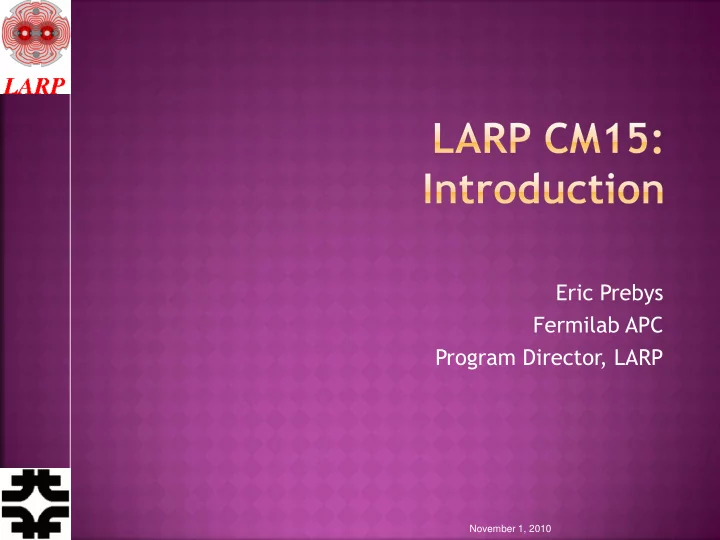
Eric Prebys Fermilab APC Program Director, LARP November 1, 2010 - PowerPoint PPT Presentation
Eric Prebys Fermilab APC Program Director, LARP November 1, 2010 Highlights since last meeting DOE Review The high luminosity LHC (HL-LHC) project 2 LARP CM15 Introduction - Prebys November 1, 2010 LHC Performance CM14:
Eric Prebys Fermilab APC Program Director, LARP November 1, 2010
Highlights since last meeting DOE Review The high luminosity LHC (HL-LHC) project 2 LARP CM15 Introduction - Prebys November 1, 2010
LHC Performance CM14: Established 3.5x3.5 collision Peak luminosity: ~1x10 28 cm -2 s -1 CM15: Peak luminosity: >2 x10 32 (~enough to reach 1 fb-1 goal in 2011!) Integrated luminosity ~50 pb -1 LARP Instrumentation CM14: All LARP instrumentation installed and operational AC Dipole and sync. light mon already part of standard operation. CM15: Lumi (BRANA) now the default tool for luminosity scans Schottky being handed off to CERN 3 LARP CM15 Introduction - Prebys November 1, 2010
Magnet Systems CM14: LQ had met its 200 T/m design goal CM15: LQ eventually reached 220 T/m HQ completed and undergoing tests LARP now identified as responsible for R&D to establish Nb 3 Sn as viable for LHC high luminosity upgrade Long Term Planning CERN has now released and official plan through the high luminosity upgrade (formerly “Phase II”) in ~2010 Base line includes both Nb 3 Sn and crab cavities Upgrade planning will be organized through EuCARD, and managed from CERN LARP will integrate itself with this activity Much more about this later 4 LARP CM15 Introduction - Prebys November 1, 2010
Energy: 3.5 TeV Energy: 6-7 TeV Collimation limit ~2x10 32 Collimation limit .5-1x10 34 Energy: ~7 TeV Energy: ~7.0 TeV 1x10 34 >5x10 34 Luminosity Lum. Collimation limit >5x10 34 5 E. Prebys, LARP Status Presented at USLUO Meeting October 29, 2010
July 15-16, 2010, at Fermilab. Reviewers: Accelerator Systems: Ali Nassiri, ANL Marion White, ANL Rod Gerig, ANL Magnet Systems: Peter McIntyre, Texas A&M George Biallas, Jlab Steve St. Lorant, SLAC Management Rod Gerig, ANL Marion White, ANL George Biallas, JLab Context LHC startup Recent cancelation of PS2 Overall, very positive… 6 LARP CM15 Introduction - Prebys November 1, 2010
1.1.2 Comments: Collimator Detailed technical and safety requirements for installation in the SPS and for evaluating performance of the device need to be clear and formally agreed upon by LARP and CERN. Pass/fail criteria in the Hi-Rad-Mat test need to be very clear before the test. The first prototype appears to be extremely complex. Possible alternatives that are less complicated with, presumably, potentially greater reliability should be pursued in parallel. 1.1.3 Recommendations: Collimator 1. None 1.2.2 Comments: Accelerator Physics - Electron Cloud Development of the fast kicker technology is interesting and potentially useful in many other applications. 1.2.3 Recommendations: Accelerator Physics - Electron Cloud 1. None 2010 LARP Review 7
1.3.1 Findings: Crab Cavities Crab cavities, championed by LARP, are now part of CERN’s baseline planning for the Phase-II luminosity upgrade. CERN now considers crab cavities essential in the luminosity upgrade foreseen for 2018-2020. Novel cavity concepts have been supported by LARP. SBIR Phase-I work was successful and Phase-II follow-on funding applied for by two companies. 1.3.2 Comments: Crab Cavities The main goal of the prototyping activity is to validate the crab cavity design. 1.3.3 Recommendations: Crab Cavities 1. Work with the CERN-RF Group to develop clear specifications and a realistic R&D plan with goals for the crab cavities. 2. Prepare a technical design report with clearly-defined roles, responsibilities, schedules, and costs. 3. Subject the R&D plan and goals to a peer-review in 2011. 2010 LARP Review 8 … 4.
1.4.1 Findings: Accelerator Physics Accelerator physics simulations have been performed in support of LARP activities RHIC and Tevatron have been used to advantage to perform beam studies. 1.4.2 Comments: None 1.4.3 Recommendations: 1. Perform simulations in the coming year to help guide CERN’s choice of quadrupole aperture. 2010 LARP Review 9
1.5.1 Findings: Instrumentation All instrumentation was delivered as promised and has worked well. CERN is interested for LARP to pursue instrumentation in support of the LHC injector chain, as expressed in Chamonix. 1.5.2 Comments: Instrumentation Great job! 1.5.3 Recommendations: Instrumentation None 2010 LARP Review 10
(… lots of very specific findings and comments about magnet program…) 2.3 Recommendations: 1. The panel strongly recommends that, during the coming year, in close consultation and cooperation with CERN, LARP undertake a substantial role for modeling energy deposition and radiation damage from beam losses and other collider issues related to the IR quad aperture decision. 2. LARP/APUL magnet program should initiate an aggressive request for funding to respond to the pre-project stages of the LHC Upgrade Project recently defined Chamonix. 3. LARP should request a letter from CERN to DOE stating that Nb3Sn Technology is the primary candidate for Interaction Region Quadrupoles of LHC Upgrade Project. 4. DOE should develop a protocol such that requests for collaboration, that are out of the existing list of LARP projects, such as the DS and D1 magnets as outlined by Gijs de Rijk at this review, can be responded to. 5. CERN is establishing a comprehensive facility for the testing of the radiation resistance of materials, insulations and superconductors in particular. Input into and adoption of the recommendations by the MS group is essential for the magnet development program. 2010 LARP Review 11
Subcommittee members: Rod Gerig, George Biallas, Marion White 3.1 Findings: LARP has made significant contributions to the achieved successes of LHC Many of the LARP activities have significant application to present and future accelerator R&D confronting US accelerators CERN has expressed their appreciation for these contributions, and notes that the LARP team is an integral part of the LHC accelerator program The Long Term Visitor and Toohig Fellows programs are viewed by CERN as very attractive and successful and benefits the US program The Chamonix meeting has redirected the course of accelerator upgrades and improvements for at least the next ten years resulting in a course for accelerator R&D that is now more strategic (five new task forces) and is dependent on LARP activities The above plan has moved a number of the milestones for specifications and deliverables related to LARP R&D 2010 LARP Review 12
Findings: continued A complimentary program called Accelerator Projects for the Upgrade of the LHC (APUL) is intended to pick up where the R&D leaves off, to deliver components to the LHC The first APUL project has been put on hold and the FY10 allocated funds ($7M) are in “hibernation mode”. The LARP team is the world’s leading effort in Nb 3 Sn SC magnets for accelerators. 2010 LARP Review 13
The quality and significance of the LARP scientific and technical accomplishments, and the merit, feasibility and impact of its planned research program: Quality, merit, significance and impact (in light of Chamonix) are high. Feasibility (i.e., the ability to deliver technology decisions by needed dates) may be constrained by funding and definition of specifications. The funding issue must be evaluated by LARP management with DOE. HEP FY12 Budget Retreat 14
The effectiveness of management in strategic planning, developing appropriate core competencies, implementing a prioritized and optimized program for potential participation in future accelerator upgrades at the LHC at CERN; specifically, are these LARP activities well aligned with present LHC schedule: LARP is in the process of responding to Chamonix. Plans have not yet come into full alignment. When the FY11 budget is defined, this needs to be the highest priority for LARP management. The effectiveness and appropriateness of the laboratory interactions to maximize the leveraging of existing infrastructure and expertise available at those laboratories. This has improved over the past few years, and laboratory interactions are appropriate and effective. HEP FY12 Budget Retreat 15
3.3 Recommendations: 1. Develop a strategic plan for LARP R&D that supports the LHC schedule, and meets the FY11 budget. Present to DOE by November 1. 2. Work with DOE and CERN to establish a formalism for the dialog and protocol which will provide the needed specifications in time to meet agreed upon milestones. 2010 LARP Review 16
Upgrade planning will be organized through EuCARD*, Centrally managed from CERN (Lucio Rossi) Non-CERN funds provided by EU Non-EU partners (KEK, LARP , etc) will be coordinated by EuCARD, but receive no money. Work Packages: WP1: Management WP2: Beam Physics and Layout WP3: Magnet Design Significant LARP and WP4: Crab Cavity Design other US Involvement WP5: Collimation and Beam Losses WP6: Machine Protection WP7: Machine/Experiment Interface WP8: Environment & Safety *European Coordination for Accelerator R&D 17 LARP CM15 Introduction - Prebys November 1, 2010
Letter to Dennis Kovar, Head Office of DOE Office of High Energy Physics, 17-August-2010 (…) 18 LARP CM15 Introduction - Prebys November 1, 2010
(…) 19 LARP CM15 Introduction - Prebys November 1, 2010
Recommend
More recommend
Explore More Topics
Stay informed with curated content and fresh updates.
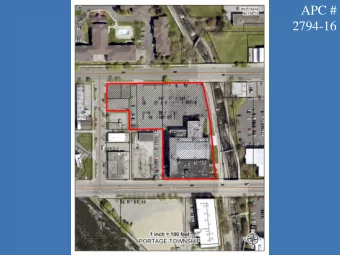

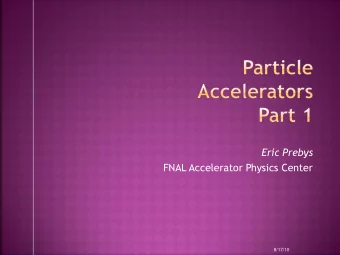
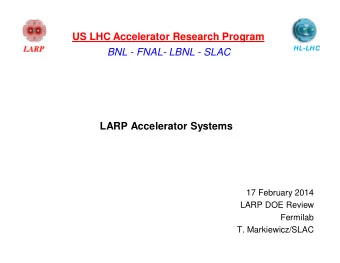
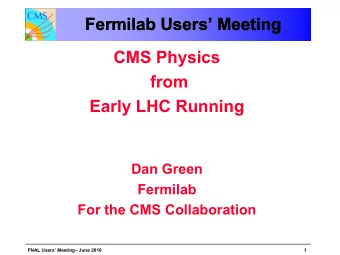
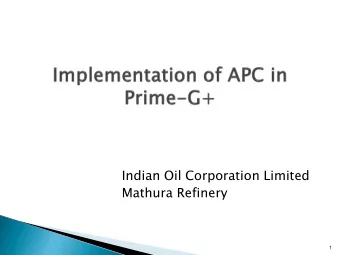
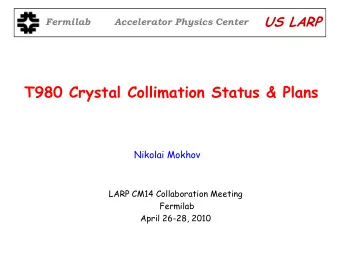
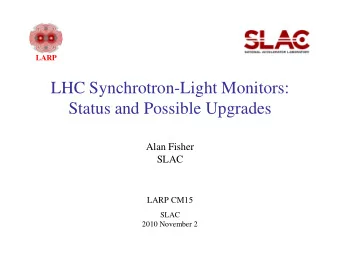
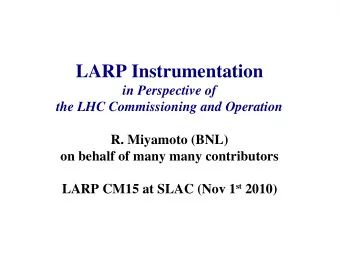
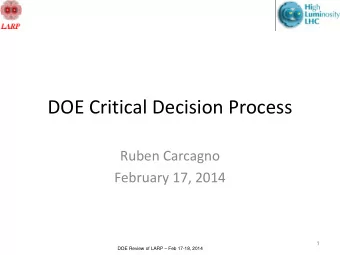
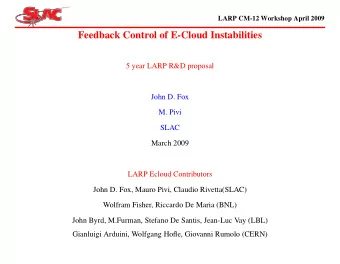

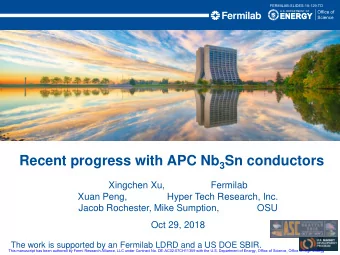
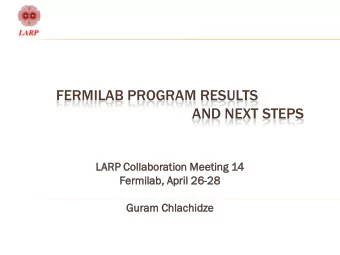
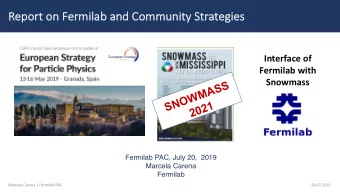
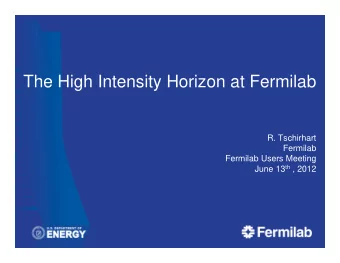
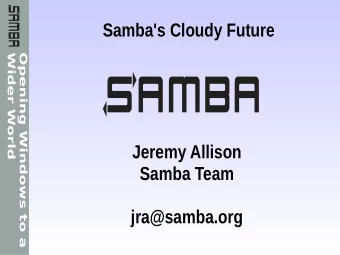
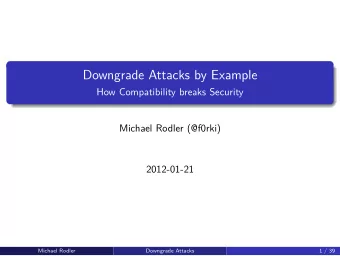
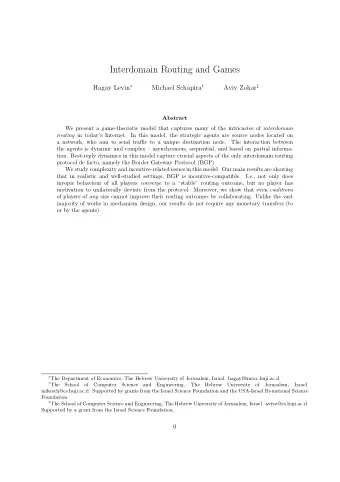
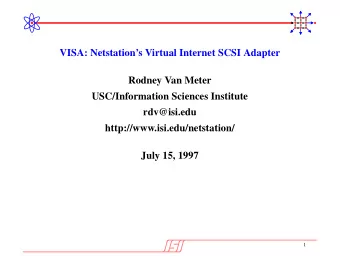
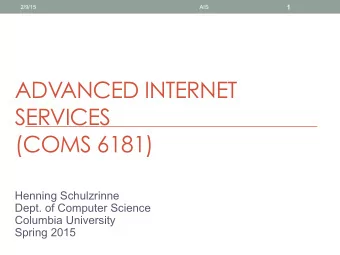
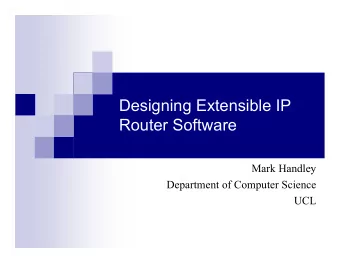
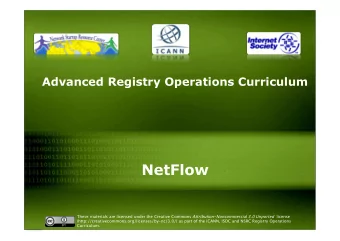
![[N ETWORKING ] Encapsulation and Layering Packets grow with headers and trailers As they trickle](https://c.sambuz.com/783496/n-etworking-s.webp)